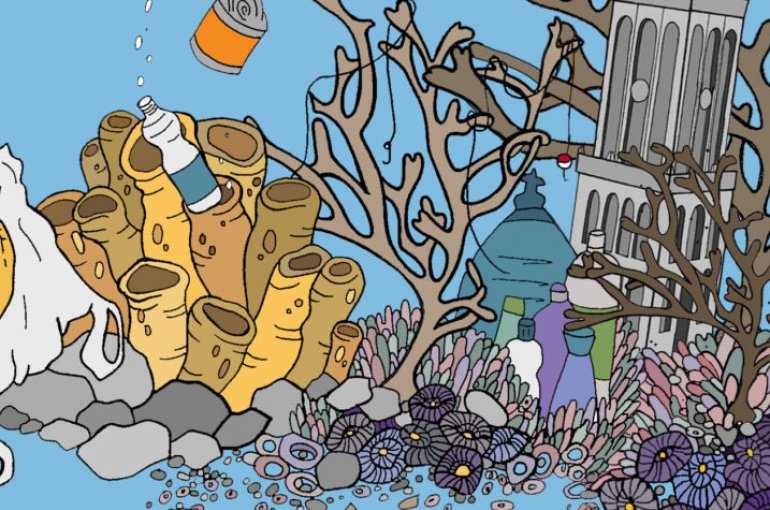7 myths about ‘plastic soup’
Is this plastic soup more like a bouillon?

Plastic: it is one of the most urgent threats to our oceans. How bad is this ‘plastic soup’, actually, and haven’t we been working on cleaning it up for years now? Oceanographer Erik van Sebille and student Aike Vonk have developed the website uu.nl/plasticsoep (in Dutch) to help answer these questions. What do you actually know about all of the plastic floating in our oceans? Time to debunk seven myths about plastic soup.
1. Whole islands of plastic are floating around the ocean
False. The term ‘plastic soup’ refers to all of the plastic polluting the ocean: from plastic bags floating near the surface, to micro- and nano-plastics dissolved in the seawater. But the plastic pollution doesn’t form large islands that float around the ocean - on the contrary: less than 1% of all of the plastic in the ocean is still floating on the surface. Much more of the plastic can be found deeper in the ocean, or sunk on the ocean floor. So instead of plastic islands, it’s more like a ‘plastic bouillon’.
2. Fortunately, we’ve already started cleaning up the plastic soup
Unfortunately, false. Many people are focused on collecting the plastic floating in the ocean, including the Ocean Clean-up project by Boyan Slat. These are admirable efforts, but floating plastic represents less than 1% of all of the plastic in the ocean. The other 99% of the plastic soup receives far less attention.
3. Biodegradable plastic is the solution to the plastic problem
False. Biodegradable plastic may seem like a solution, because if it decomposes in nature, it cannot wash from the land into the oceans. Unfortunately, that’s not how it works. Biodegradable plastic can usually only be broken down through exposure to large amounts of light, oxygen, and heat. These conditions are anything but ‘natural’, especially in the ocean. That means even biodegradable plastic can remain in the ocean for a very long time.
4. Many animal species are threatened with extinction due to plastic waste
This is not true, although there is reason for concern. It is true that 100% of all sea turtles, 59% of all whales, 36% of all seals, and 40% of all marine birds studied have had plastic in their stomachs. But although the animals eat plastic, not many of them die from it. As far as we know, there are no animal species on the verge of extinction due to eating plastic waste.
5. Only nature suffers from the negative effects of plastic soup
False: human endeavours such as fishing, shipping, aquaculture, tourism, and recreation are also negatively affected by plastic in the ocean. That includes fishermen whose catch is decreasing due to smaller fish populations, or the effect on local tourist industries when tourists avoid beaches known to be strewn with plastic waste.
6. I’m not personally affected by the plastic soup
That depends on your diet. Hundreds of species of marine animals have plastic in their digestive systems, including fish and shellfish consumed by humans. A study in Belgium calculated how much plastic mussel connoisseurs inadvertently consume each year. People who eat a lot of mussels can ingest up to 11,000 pieces of plastic in a single year. That equals around 90 pieces per meal, spread out over 122 meals, or around the same amount of plastic as eating a sandwich baggie along with your sandwich for lunch! But keep in mind: we still don’t know how dangerous that is, as scientists are still studying the effect of microplastic on human health.
7. I can’t do anything to prevent or solve the problem of plastic soup
When a problem spans the globe like the plastic soup does, it can often seem as if one person can’t make much of a difference. But nothing could be further from the truth, because we are the ones buying, using, and disposing of the plastic. It may sound like a cliché, but that’s because it’s true: change begins with yourself. Many activities currently underway around the world started out as very small-scale initiatives. For example, the My Little Plastic Footprint app helps you use less plastic.

